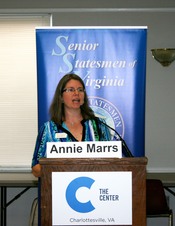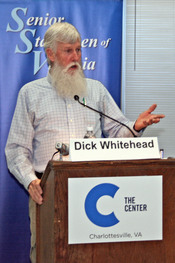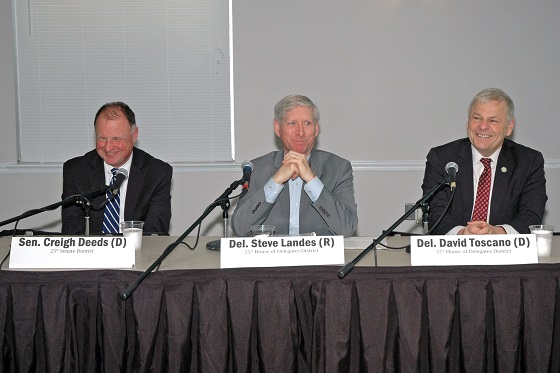The Center at Belvedere
Posted March 15th, 2020 by EllaCategories: Programs
The Grand Opening of The Center at Belvedere was going to be April 18, 2020, but it has been postponed. The Center will offer all the key ingredients for aging well including programs to promote social, physical and intellectual wellness. In this podcast, The Center Executive Director Peter Thompson shares his plans for the new facility. The charts shown include photos of the new facility and they can be downloaded here. The program was moderated by SSV President Jeff Gould.
 Peter Thompson joined The Center in 1999. A resident of Charlottesville for more than 40 years, he received his undergraduate degree from the University of Virginia and his MPA with a concentration in nonprofit management from VCU.
Peter Thompson joined The Center in 1999. A resident of Charlottesville for more than 40 years, he received his undergraduate degree from the University of Virginia and his MPA with a concentration in nonprofit management from VCU.
While serving from 2006-2012 on the National Institute of Senior Centers (NISC) Delegate Council, a part of the National Council on Aging (NCOA), Peter chaired a national task force on New Models of Senior Centers; the resulting report was published in the Journal for Applied Gerontology. He serves as a NISC accreditation reviewer and standards trainer.
Recently, he worked with a small group of his peers to found the Virginia Association of Senior Centers within the Virginia Recreation and Parks Society. This association gives senior centers a greater voice in helping Virginia and its localities prepare for the age wave. He has also served on the Board of Directors of the Charlottesville Regional Chamber of Commerce, Osher Lifelong Learning Institute at UVA, and Madison House. He was a founding director for the Virginia Network of Nonprofit Organizations (VANNO), serving two years as chair, and for the Center for Nonprofit Excellence (CNE) in Charlottesville. In 2010, the United Way Thomas Jefferson Area selected Peter for the Excellence in Nonprofit Leadership award.
Program Summary
 The Center on Hillsdale Drive is now closed and the new Center at Belvedere is opening in April 2020. The Weldon Cooper Research Group was hired to study the case for an expansive vision for the center as a vibrant facility with an ambitious outreach plan. The senior population of our area has increased from 24,488 in 2000 to estimated 42,791 in 2020.
The Center on Hillsdale Drive is now closed and the new Center at Belvedere is opening in April 2020. The Weldon Cooper Research Group was hired to study the case for an expansive vision for the center as a vibrant facility with an ambitious outreach plan. The senior population of our area has increased from 24,488 in 2000 to estimated 42,791 in 2020.
Aging population impacts not just healthcare, but also community planning, social services, economic development and families. Active aging and increased longevity add more contributors and less cost to society. To that end, The Center sees its role to provide programs that support active aging, partnerships with area organizations, space for community groups, community and civic engagement, and awareness of aging issues.
One could not help but be impressed by the thoughtful design of the new facility to accommodate these goals. Intentionally designed for diverse and changing needs with floating exercise floors, lots of space for activities or private small group conversations as well as the safety concerns in parking lots and lighting. A Sentara Family Medicine practice is included and there is bus accessibility. Peter added that the Center has come in ahead of schedule and under budget! Membership options were explained. The new Center has a cost of $24 Million of which $22 million has been raised. Contributions will be gratefully accepted.

 The
The 
 Former Lieutenant Governor of Virginia, The Honorable John Hager, talks about his career in politics. The Best Seat in the House is the title of his 2017 book.
Former Lieutenant Governor of Virginia, The Honorable John Hager, talks about his career in politics. The Best Seat in the House is the title of his 2017 book.

 John Lynch is the district engineer for the Virginia Department of Transportation’s Culpeper District, a position he has held since June 2013. He is responsible for VDOT’s construction, maintenance and operations programs in nine Piedmont Virginia counties, from Fauquier south through Albemarle. Lynch has successfully led the development and delivery of several major highway improvement projects, including the $250 million Route 29 Solutions program in Albemarle County.
John Lynch is the district engineer for the Virginia Department of Transportation’s Culpeper District, a position he has held since June 2013. He is responsible for VDOT’s construction, maintenance and operations programs in nine Piedmont Virginia counties, from Fauquier south through Albemarle. Lynch has successfully led the development and delivery of several major highway improvement projects, including the $250 million Route 29 Solutions program in Albemarle County.





 Bellamy Brown (I), 40, who grew up in the city’s Venable neighborhood, stood in the sanctuary of the Rosser Avenue church his grandfather founded and formally announced his run for the council. He has graduate degrees in finance and accounting, served in the U.S. Marine Corps, is studying politics and leadership and hopes to sit on the Charlottesville City Council.
Bellamy Brown (I), 40, who grew up in the city’s Venable neighborhood, stood in the sanctuary of the Rosser Avenue church his grandfather founded and formally announced his run for the council. He has graduate degrees in finance and accounting, served in the U.S. Marine Corps, is studying politics and leadership and hopes to sit on the Charlottesville City Council. Michael Payne (D) is a community organizer focusing on addressing Charlottesville’s affordable housing crisis. He worked with Habitat for Humanity Virginia and the Charlottesville Low-Income Housing Coalition, and co-founded Indivisible Charlottesville — a group dedicated to fighting for progressive causes throughout central Virginia.
Michael Payne (D) is a community organizer focusing on addressing Charlottesville’s affordable housing crisis. He worked with Habitat for Humanity Virginia and the Charlottesville Low-Income Housing Coalition, and co-founded Indivisible Charlottesville — a group dedicated to fighting for progressive causes throughout central Virginia. Lloyd Snook (D) grew up in Charlottesville. He attended Venable Elementary School and Walker Junior High, and graduated from Lane High School in 1970. He graduated from Stanford with an A.B. in Economics, and worked as an investment analyst for two years before going to the University of Michigan School of Law. He concentrated his studies in criminal and constitutional law, and graduated cum laude in 1979. He and Sheila Haughey were married the day after they graduated from the University of Michigan School of Law.
Lloyd Snook (D) grew up in Charlottesville. He attended Venable Elementary School and Walker Junior High, and graduated from Lane High School in 1970. He graduated from Stanford with an A.B. in Economics, and worked as an investment analyst for two years before going to the University of Michigan School of Law. He concentrated his studies in criminal and constitutional law, and graduated cum laude in 1979. He and Sheila Haughey were married the day after they graduated from the University of Michigan School of Law.

